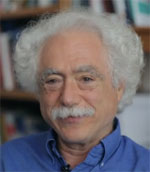
View video interview here: http://www.collaborativesociety.org/2016/05/05/terry-winograd/
So I've been teaching Computer Science for more than 40 years. Almost all of that here at Stanford. And in the course of that I've had the great fortune to participate in probably the most 40 exciting years of development in technology ever and certainly for the electronic world, Silicon Valley, there's been this tremendous growth and change. I started off in Artificial Intelligence and after a couple of decades of that decided that the direction that was being taken in that field was actually not getting to the goals that we wanted. So I sort of stepped back, ended up writing a book with Fernando Flores in which we look at some philosophical foundations for what are the problems with how we approach Artificial Intelligence and shifted my own work into what's called Human Computer Interaction.
The Connection to Hubert Dreyfus
I've had an interesting, long-term awareness of Dreyfus and connection with him. He was actually at MIT, I think, shortly before I was there as a graduate student. I think he had left just before then. And had written a very strong critique of the Artificial Intelligence laboratory, which is where I was a student. And at that point I think the view, certainly among faculty and my colleagues, there was that he was just being stupid. That he was saying there are inherently reasons why computers can't do this, but that he wasn't up-to-date with the technical things that were being achieved. And I think there is there the simple fallacy, and he had a great metaphor for this, which is somebody who's climbing a tree to get to the moon. And if I say "I'm going to get to the moon" and I'm climbing this tree and look how fast I'm going up. My view from that point of view is I'm making great progress. You have to stand back and say "wait a minute, you're going to be at the top of the tree and you're not near the moon, right?" He was saying something like that to people who were very excited about the next branch they were climbing on the tree, successfully. I mean there was great advances compared to what had been previously possible on computers.
So I was aware of that, I never really talked to him, I think, at that point. But when I came to California and we started having graduate students at Berkeley and at Stanford who were talking to each other and so on, we started having some meetings with John Cirral and some other people who I worked with here. Danny Barbara who was in Artificial Intelligence. Just to get together and compare notes. And he came at a time when I was seeing severe limitations in what we could achieve with the Artificial Intelligence techniques, but not having a real framework for saying why. And I think what his work did is really give me a way of understanding that. He said okay think about this from a phenomenological perspective, not everything can be reduced to rational symbolic structures and so on. And it all made sense with my experience because I was experiencing the problems that he was describing. So we've never collaborated directly in the sense of writing together or working on a project together, but we've been friends and discussing things for many years.
The Phenomenological Critique
I think it's an interesting question as to what degree the kind of phenomenological critique of technology is generative in the technology itself. There were attempts back many years ago by Phil Agrieve at MIT for example to do "Phenomenological AI" and I don't think it was obviously successful by any means. And I think that's partly because it's not intended to be a "how do you do it?" kind of approach. It' more of a "why do you think about certain questions?" And for me I've always said that the phenomenological perspective is more about the questions you ask than giving you answers to them. But what it does is it shifts your focus, for example, away from having the computer be intelligent or have a lot of knowledge to the question of "what's happening to people when they use it?" So if you look at a lot of what goes on in Human Computer Interaction today they've made a shift which, I wouldn't say it's because of Dreyfus of because of the book I did with Flores, but certainly it's part of that same long-term direction to focusing their questions on the understanding of how the things people do with computers play a role in their living, their experience, their world rather than focusing just on what's on the screen.
CollaborativeSociety.org is a site which explores the thinking of researchers, academicians and thought-leaders on the topic of collaboration, among other things. Thanks to Alfred Birkegaard and Katja Carlsen for providing the video content. The contribution of The Collaboration Project is these transcripts.